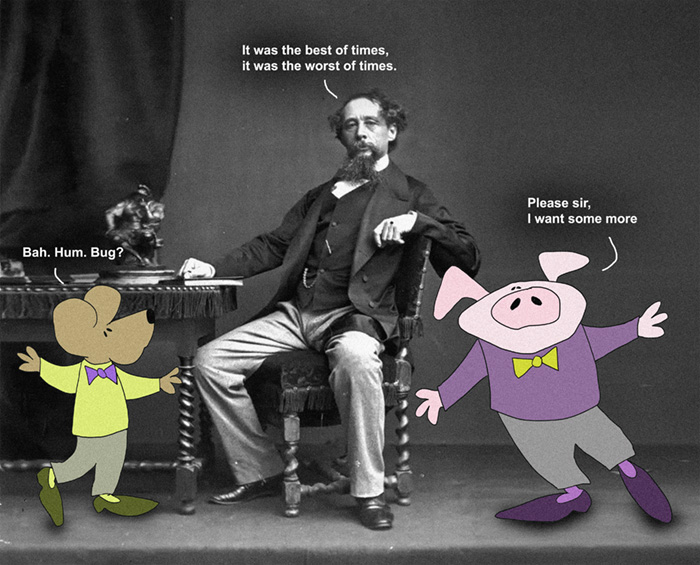I haven’t actually read too much in the way of Charles Dickens. But I know many of his stories thanks to the world of film. I know, I know. I should read the books, you say. It was the best of times, it was the worst of times. The thing is, I get hung up on the language. The man doesn’t write a short sentence. Apparently, my brain needs a short sentence.
Yet, his stories were so good. He told all of us about the gruesome truths of Victorian England. He explored the darkest deeps of Britain’s social class system. He brought us the Ghost of Christmas Past.
In his day, he was loved by the public. He had unprecedented celebrity for a writer. Red carpet, baby. Red carpet. As such, it made him the most popular novelist of his century. Since that time, Charles Dickens’s books have never been out of print.
I mention him today because this is the anniversary of his death, June 9, 1870. When Charles Dickens died, he was only fifty-eight. His health had been troubling him for some time. But up to that point, he had such astounding energy about him. Not only that, he was immersed in his ongoing work. He felt like he had so much to do and was halfway through writing The Mystery of Edwin Drood. Truly it was the perfect mystery because no one knows how he intended the story to end.
I wrote about his death in one of my books. So I guess that might make up for not reading him.
There is a lot to know about the guy’s life. Starting out, things were kind of rough on little Chucky. He was the eldest son of Elizabeth and John Dickens. Born in February 1812, in the British city of Portsmouth.
The family moved around quite a bit, first to Yorkshire and then to London. He was known as a “very small and not over-particularly-taken-care-of boy.” A little street urchin if you ask me. Just like one of the ruffians in Oliver, probably.
But then it happened. His dear old dad John had amassed so much debt that the entire family was sent to Marshalsea debtors’ prison. Everyone except for Charles and his older sister Fanny. I’m not sure why these two got a pass, but at only 12 years old, the little Chuckster had to work at a place called Warren’s Blacking Warehouse, earning six shillings a week. His great job was pasting labels onto blacking pots used for shoe polish. “Please, sir. We want some more.”
I imagine all these experiences impacted his writing later in life, as well.
As a young adult, in 1832, at the age of 20, he was drawn to the theatre. Charles joined an acting club, and through some work, he landed an audition at Covent Garden. He prepared and prepared, but as fate would have it, he missed the audition because he caught a dang cold. He switched gears while he tried to get another audition. He began writing and submitting articles to different periodicals throughout London.
That led to working as as a political journalist, reporting on Parliamentary debates, and he traveled across Britain to cover election campaigns for the Morning Chronicle. From there, his books.
Here’s the thing I really love about Charles Dickens. He owned a beloved raven he named Grip. His bird even appeared as a character in his novel Barnaby Rudge. Grip and Charles did everything together.
So, his best buddy bird died after it ate lead paint chips later that year. Dickens was very sad but replaced it with another raven, also called Grip. The second Grip was the inspiration behind Edgar Allan Poe’s poem “The Raven.”
When the second Grip passed away, Dickens had a taxidermist stuff and mount the bird in an elaborate wooden and glass case. If you want to see his bird, it is on display in the Free Library of Philadelphia’s collection.
So, a glimpse of Dickens. What I’ve learned most from reading about him, is that once again, I’m shown this: Everything is connected.
His true-life events showed up in many of his books. The things he experienced, went on to make experiences for so many others. Same with us. Every experience we have had is what makes up the likes of us. From head to toe. And that person — that walking, talking container of past experiences — goes on to affect others, in everything we do.
And that is our raven. That is our Oliver Twist.
===========
“Have a heart that never hardens, and a temper that never tires, and a touch that never hurts.”
— Charles Dickens, Our Mutual Friend
============
“There is a wisdom of the head and wisdom of the heart.”
— Charles Dickens, Hard Times
============
“The most important thing in life is to stop saying, ‘I wish’ and start saying, ‘I will’. Consider nothing impossible, then treat possibilities as probabilities.”
— Charles Dickens, David Copperfield
============
That beats the Dickens out of me.
